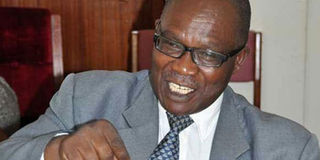Govt wants public servants to contribute to pension

What you need to know:
- In 2004, Cabinet under minute 154(CT2004) approved the introduction of a Defined Contributions (DC) Pension Scheme in the Public Service and the proposal was presented to Cabinet but was deferred pending the establishment of a regulatory framework for the pension sector.
- In 2011, the Uganda Retirement Benefits Regulatory Act (UBRA) was enacted and a World Bank led study recommended the Defined Benefit Pension Scheme.
Public servants will be required to make a monthly remittance of five per cent of each worker’s monthly salary in addition to a 10 per cent contribution by government to the Public Service Pension Fund envelope, government has revealed.
This is meant to finance the pension fund they are meant to get upon retirement.
The proposal will come into effect once Parliament approves the Public Service Pension Fund Bill 2020, that was presented by officials from the Ministry of Public Service to the Legal Affairs Committee of Parliament in Kampala yesterday.
The Bill, among others, seeks to transform from a non-funded, non-contributory system to a funded and contributory system to guarantee fiscal sustainability and build a robust and efficient pension scheme for government workers.
If enacted into the law, the government will be allowed to provide for the creation of a scheme from which the remitted funds will be got and invested in profit-yielding ventures as a way of generating dividends which will not only sustain the scheme but also benefit its contributors.
The Minister of Public Service, Mr Muruli Mukasa, said the law will address challenges that stifle the current pension system his ministry uses.
“The current one has got a lot of challenges where even payment itself is not guaranteed and payment cannot be sustained over a long period because it is non-contributory,” Mr Mukasa told the Daily Monitor.
Mr Mukasa said beneficiaries will be assigned what he called “a special number” that workers will use to track their remittances and establish what they are entitled to upon retirement.
“Therefore it will be automatic that at retirement, one will get his or her entitlements,” Mr Muruli said.
He added: “The board of trustees will determine which bank they are going to use (or) where the money is kept. And the custodians under the Uganda Retirement Benefits Regulatory Act (UBRA) will give guidance on how the money will be invested.”
Unlike the provisions under the National Social Security Fund (NSSF) where the workers are given a wholesome fund upon retirement, the proposal presented to the legislators indicated that beneficiaries will continue receiving from the scheme until death.
When asked how the dividends will be calculated and distributed, the minister said: “There is a formula which is going to be used which is similar to the amount of pension you are meant to get. It will depend on the last salary you got because pension is pegged on that.”
The commissioner of Human Resource Management at the Ministry, Mr Victor Bua Leku, said beneficiary’s entitlements will remain intact in case government fails to register profit in ventures that the money is invested in.




